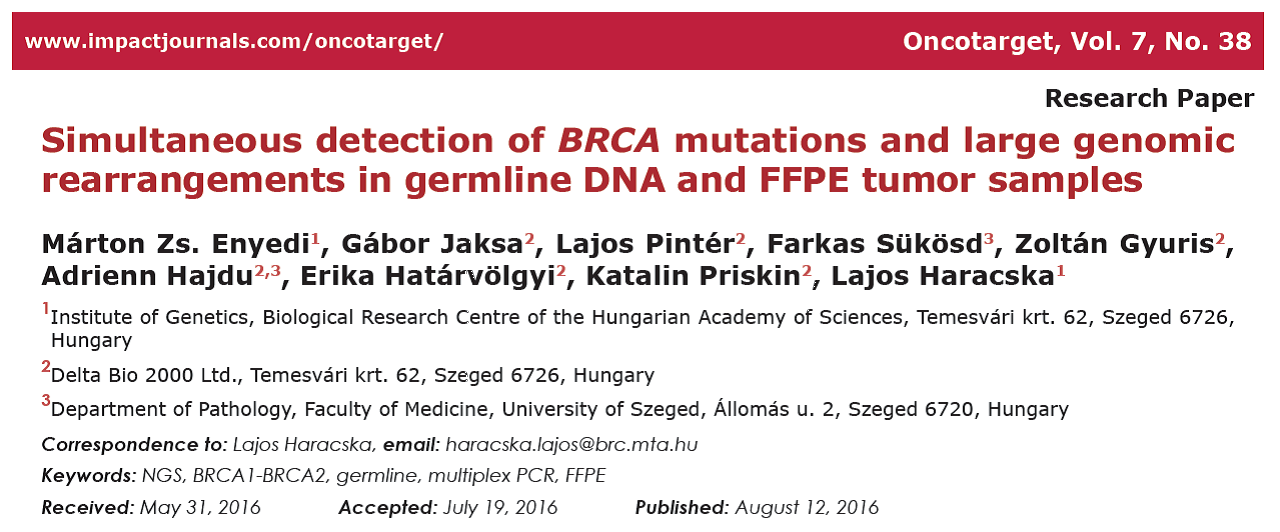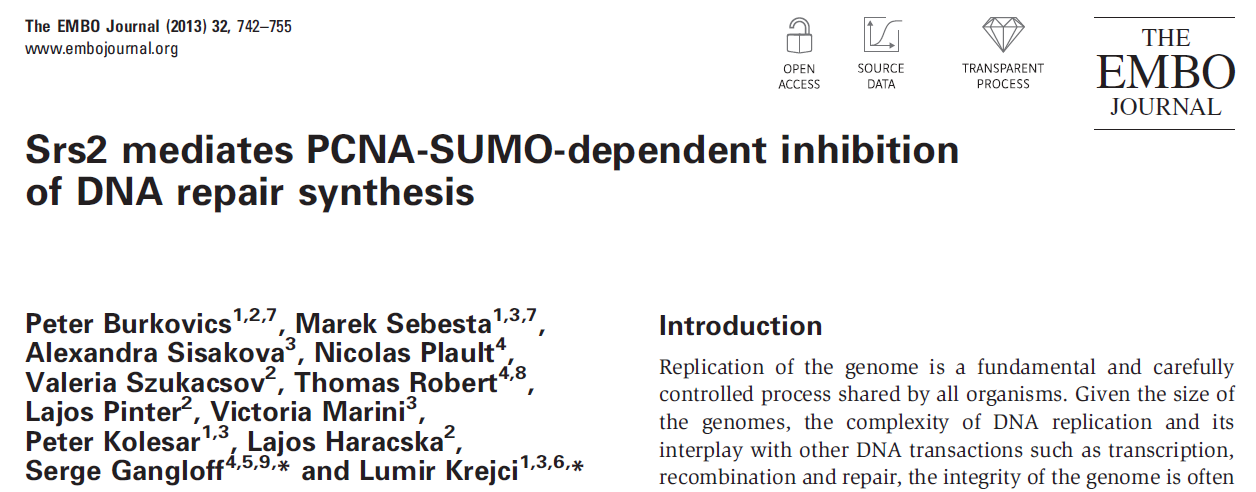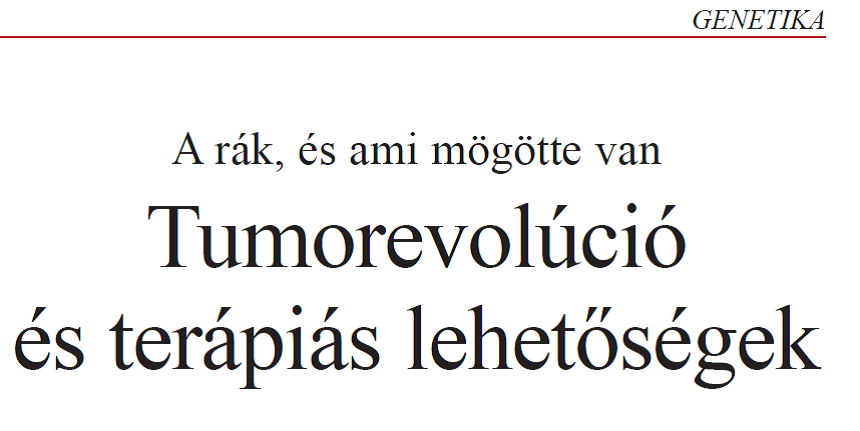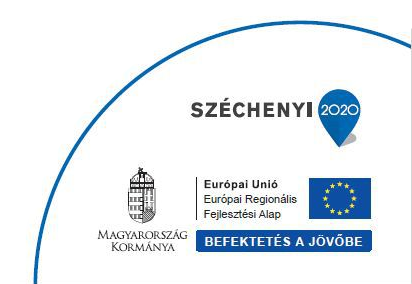Tudományos közlemények
Tudományos közlemények

A tudományos közlemény a Delta Bio 2000 Kft. kutatási és fejlesztési tevékenysége során született új eljárás beállításáról és validálásáról szól. Az eljárás segítségével két gén (BRCA1 és BRCA2), teljes mutációs analízise történhet meg natív (vér, nyálkahártya stb.) és a műtéti anyagok fixálásánál használt parafinba ágyazott formalinnal fixált mintákból származó DNS-ből. A BRCA1 és BRCA2 gének elváltozásai jelenetős szerepet játszhatnak mell- és petefészekrákok kialakulásában.
A tudományos közlemény a Delta Bio 2000 Kft. kutatási és fejlesztési tevékenysége során született új eljárás beállításáról és validálásáról szól. Az eljárás segítségével két gén (BRCA1 és BRCA2), teljes mutációs analízise történhet meg natív (vér, nyálkahártya stb.) és a műtéti anyagok fixálásánál használt parafinba ágyazott formalinnal fixált mintákból származó DNS-ből. A BRCA1 és BRCA2 gének elváltozásai jelenetős szerepet játszhatnak mell- és petefészekrákok kialakulásában.

A közlemény a Delta Bio 2000 Kft. két vezető kutatójának részvételével a DNS elváltozásainak megakadályozására szolgáló mechanizmusok megértéséhez szolgál újabb információkkal.
A közlemény a Delta Bio 2000 Kft. két vezető kutatójának részvételével a DNS elváltozásainak megakadályozására szolgáló mechanizmusok megértéséhez szolgál újabb információkkal.

A közleményben egy olyan új technológia bemutatása és első leírása történik meg, amely az elsődlegesen az alapkutatásban nyújt lehetőséget a DNS-ben keletkező károsodások specifikus kimutatására, azonban segítségével jól jellemezhetőek élő szervezetekből származó őssejtek, daganat sejtek. Az eljárás segít annak felderítésében, hogy az adott sejtpopuláció mennyire érzékeny karcinogénekre, illetve milyen gyorsan képes a sejtekben keletkező DNS hibák kijavítására.
A közleményben egy olyan új technológia bemutatása és első leírása történik meg, amely az elsődlegesen az alapkutatásban nyújt lehetőséget a DNS-ben keletkező károsodások specifikus kimutatására, azonban segítségével jól jellemezhetőek élő szervezetekből származó őssejtek, daganat sejtek. Az eljárás segít annak felderítésében, hogy az adott sejtpopuláció mennyire érzékeny karcinogénekre, illetve milyen gyorsan képes a sejtekben keletkező DNS hibák kijavítására.

Fővárosi állatorvos 2015/2
Fővárosi állatorvos 2015/2
Egyéb, a Delta Bio 2000 Kft.-hez köthető tudományos publikációk
Egyéb, a Delta Bio 2000 Kft.-hez köthető tudományos publikációk
- Sánta ÁT, Gráf A, Vincze-Kontár K, Kovács K, Bóna B, Mórocz M, Kiss E, Haracska L. Advancing inducible gene-inactivation systems to explore synthetic lethality. NAR Cancer. 2026. PMID: 41736896
- Pekker E, Qorri E, Enyedi MZ, Szukacsov V, Ayaydin F, Szabó-Kriston É, Csányi B, Mórocz M, Sükösd F, Kiss-Tóth E, Haracska L. Comprehensive bulk and single-cell RNA sequencing uncovers senescence-associated biomarkers in therapeutic mesenchymal stem cells. Sci Rep. 2025. PMID: 41326705
- Takács B, Jaksa G, Qorri E, Gyuris Z, Pintér L, Haracska L. Advancing metagenomic classification with NABAS+: a novel alignment-based approach. NAR Genom Bioinform. 2025. PMID: 40630933
- Daruka L, Czikkely MS, Szili P, Farkas Z, Balogh D, Grézal G, Maharramov E, Vu TH, Sipos L, Juhász S, Dunai A, Daraba A, Számel M, Sári T, Stirling T, Vásárhelyi BM, Ari E, Christodoulou C, Manczinger M, Enyedi MZ, Jaksa G, Kovács K, van Houte S, Pursey E, Pintér L, Haracska L, Kintses B, Papp B, Pál C. ESKAPE pathogens rapidly develop resistance against antibiotics in development in vitro. Nat Microbiol. 2025. PMID: 39805953
- Mamar H, Fajka-Boja R, Mórocz M, Jurado EP, Zentout S, Mihuţ A, Kopasz AG, Mérey M, Smith R, Sharma AB, Lakin ND, Bowman AJ, Haracska L, Huet S, Timinszky G. The loss of DNA polymerase epsilon accessory subunits POLE3-POLE4 leads to BRCA1-independent PARP inhibitor sensitivity. Nucleic Acids Res. 2024. PMID: 38828775
- Mórocz M, Qorri E, Pekker E, Tick G, Haracska L. Exploring RAD18-dependent replication of damaged DNA and discontinuities: A collection of advanced tools. J Biotechnol. 2024. PMID: 38072328
- Pekker E, Priskin K, Szabó-Kriston É, Csányi B, Buzás-Bereczki O, Adorján L, Szukacsov V, Pintér L, Rusvai M, Cooper P, Kiss-Tóth E, Haracska L. Development of a Large-Scale Pathogen Screening Test for the Biosafety Evaluation of Canine Mesenchymal Stem Cells. Biol Proced Online. 2023. PMID: 38097939
- Imre G, Takács B, Czipa E, Drubi AB, Jaksa G, Latinovics D, Nagy A, Karkas R, Hudoba L, Vásárhelyi BM, Pankotai-Bodó G, Blastyák A, Hegedűs Z, Germán P, Bálint B, Ahmed Abdullah KS, Kopasz AG, Kovács A, Nagy LG, Sükösd F, Pintér L, Rülicke T, Barta E, Nagy I, Haracska L, Mátés L. Prolonged activity of the transposase helper may raise safety concerns during DNA transposon-based gene therapy. Mol Ther Methods Clin Dev. 2023. PMID: 37025950
- Qorri E, Takács B, Gráf A, Enyedi MZ, Pintér L, Kiss E, Haracska L. A Comprehensive Evaluation of the Performance of Prediction Algorithms on Clinically Relevant Missense Variants. Int J Mol Sci. 2022. PMID: 35887294
- Fenteany G, Sharma G, Gaur P, Borics A, Wéber E, Kiss E, Haracska L. A series of xanthenes inhibiting Rad6 function and Rad6-Rad18 interaction in the PCNA ubiquitination cascade. iScience. 2022. PMID: 35355521
- Toth R, Balogh D, Pinter L, Jaksa G, Szeplaki B, Graf A, Gyorfy Z, Enyedi MZ, Kiss E, Haracska L, Unk I. The Rad5 Helicase and RING Domains Contribute to Genome Stability through their Independent Catalytic Activities. J Mol Biol. 2022. PMID: 34990655
- Majoros H, Borsos BN, Ujfaludi Z, Páhi ZG, Mórocz M, Haracska L, Boros IM, Pankotai T. SerpinB10, a Serine Protease Inhibitor, Is Implicated in UV-Induced Cellular Response. Int J Mol Sci. 2021. PMID: 34445206
- Priskin K, Pólya S, Pintér L, Jaksa G, Csányi B, Enyedi MZ, Sági-Zsigmond E, Sükösd F, Oláh-Németh O, Kelemen G, Nikolényi A, Uhercsák G, Sántha D, Dobi Á, Szilágyi É, Valicsek E, Tordai L, Tóth R, Kahán Z, Haracska L. BC-Monitor: Towards a Routinely Accessible Circulating Tumor DNA-Based Tool for Real-Time Monitoring Breast Cancer Progression and Treatment Effectiveness. Cancers (Basel). 2021. PMID: 34298704
- Li Q, Dudás K, Tick G, Haracska L. Coordinated Cut and Bypass: Replication of Interstrand Crosslink-Containing DNA. Front Cell Dev Biol. 2021. PMID: 34262911
- Gráf A, Enyedi MZ, Pintér L, Kriston-Pál É, Jaksa G, Bálind Á, Ezer É, Horváth P, Sükösd F, Kiss E, Haracska L. The Combination of Single-Cell and Next-Generation Sequencing Can Reveal Mosaicism for BRCA2 Mutations and the Fine Molecular Details of Tumorigenesis. Cancers (Basel). 2021. PMID: 34068254
- Kriston-Pál É, Haracska L, Cooper P, Kiss-Tóth E, Szukacsov V, Monostori É. A Regenerative Approach to Canine Osteoarthritis Using Allogeneic, Adipose-Derived Mesenchymal Stem Cells. Safety Results of a Long-Term Follow-Up. Front Vet Sci. 2020. PMID: 32903517
- Fenteany G, Gaur P, Sharma G, Pintér L, Kiss E, Haracska L. Robust high-throughput assays to assess discrete steps in ubiquitination and related cascades. BMC Mol Cell Biol. 2020. PMID: 32228444
- Janel-Bintz R, Kuhn L, Frit P, Chicher J, Wagner J, Haracska L, Hammann P, Cordonnier AM. Proteomic Analysis of DNA Synthesis on a Structured DNA Template in Human Cellular Extracts: Interplay Between NHEJ and Replication-Associated Proteins. Proteomics. 2020. PMID: 31999075
- Seidel H, Haracska B, Naumann J, Westhofen P, Hass MS, Kruppenbacher JP. Laboratory Limitations of Excluding Hereditary Protein C Deficiency by Chromogenic Assay: Discrepancies of Phenotype and Genotype. Clin Appl Thromb Hemost. 2020. PMID: 32309994
- Fenteany G, Gaur P, Hegedűs L, Dudás K, Kiss E, Wéber E, Hackler L, Martinek T, Puskás LG, Haracska L. Multilevel structure-activity profiling reveals multiple green tea compound families that each modulate ubiquitin-activating enzyme and ubiquitination by a distinct mechanism. Sci Rep. 2019. PMID: 31488855
- Peng M, Cong K, Panzarino NJ, Nayak S, Calvo J, Deng B, Zhu LJ, Morocz M, Hegedus L, Haracska L, Cantor SB. Opposing Roles of FANCJ and HLTF Protect Forks and Restrain Replication during Stress. Cell Rep. 2018. PMID: 30232006
- Palankar R, Binsker U, Haracska B, Wesche J, Greinacher A, Hammerschmidt S. Interaction between the Staphylococcus aureus extracellular adherence protein Eap and its subdomains with platelets. Int J Med Microbiol. 2018. PMID: 29691140
- Toth T, Balassa T, Bara N, Kovacs F, Kriston A, Molnar C, Haracska L, Sukosd F, Horvath P. Environmental properties of cells improve machine learning-based phenotype recognition accuracy. Sci Rep. 2018. PMID: 29973621
- Brasko C, Smith K, Molnar C, Farago N, Hegedus L, Balind A, Balassa T, Szkalisity A, Sukosd F, Kocsis K, Balint B, Paavolainen L, Enyedi MZ, Nagy I, Puskas LG, Haracska L, Tamas G, Horvath P. Intelligent image-based in situ single-cell isolation. Nat Commun. 2018. PMID: 29335532
- Mórocz M, Zsigmond E, Tóth R, Enyedi MZ, Pintér L, Haracska L. DNA-dependent protease activity of human Spartan facilitates replication of DNA-protein crosslink-containing DNA. Nucleic Acids Res. 2017. PMID: 28053116
- Kriston-Pál É, Czibula Á, Gyuris Z, Balka G, Seregi A, Sükösd F, Süth M, Kiss-Tóth E, Haracska L, Uher F, Monostori É. Characterization and therapeutic application of canine adipose mesenchymal stem cells to treat elbow osteoarthritis. Can J Vet Res. 2017. PMID: 28197017
- Toth A, Hegedus L, Juhasz S, Haracska L, Burkovics P. The DNA-binding box of human SPARTAN contributes to the targeting of Polη to DNA damage sites. DNA Repair (Amst). 2017. PMID: 27838458
- Enyedi MZ, Jaksa G, Pintér L, Sükösd F, Gyuris Z, Hajdu A, Határvölgyi E, Priskin K, Haracska L. Simultaneous detection of BRCA mutations and large genomic rearrangements in germline DNA and FFPE tumor samples. Oncotarget. 2016. PMID: 27533253
- Burkovics P, Dome L, Juhasz S, Altmannova V, Sebesta M, Pacesa M, Fugger K, Sorensen CS, Lee MY, Haracska L, Krejci L. The PCNA-associated protein PARI negatively regulates homologous recombination via the inhibition of DNA repair synthesis. Nucleic Acids Res. 2016. PMID: 26792895
- Achar YJ, Balogh D, Neculai D, Juhasz S, Morocz M, Gali H, Dhe-Paganon S, Venclovas Č, Haracska L. Human HLTF mediates postreplication repair by its HIRAN domain-dependent replication fork remodelling. Nucleic Acids Res. 2015. PMID: 26350214
- Baldeck N, Janel-Bintz R, Wagner J, Tissier A, Fuchs RP, Burkovics P, Haracska L, Despras E, Bichara M, Chatton B, Cordonnier AM. FF483-484 motif of human Polη mediates its interaction with the POLD2 subunit of Polδ and contributes to DNA damage tolerance. Nucleic Acids Res. 2015. PMID: 25662213
- Burkovics P, Sebesta M, Balogh D, Haracska L, Krejci L. Strand invasion by HLTF as a mechanism for template switch in fork rescue. Nucleic Acids Res. 2014. PMID: 24198246
- Daraba A, Gali VK, Halmai M, Haracska L, Unk I. Def1 promotes the degradation of Pol3 for polymerase exchange to occur during DNA-damage--induced mutagenesis in Saccharomyces cerevisiae. PLoS Biol. 2014. PMID: 24465179
- Sebesta M, Burkovics P, Juhasz S, Zhang S, Szabo JE, Lee MY, Haracska L, Krejci L. Role of PCNA and TLS polymerases in D-loop extension during homologous recombination in humans. DNA Repair (Amst). 2013. PMID: 23731732
- Mórocz M, Gali H, Raskó I, Downes CS, Haracska L. Single cell analysis of human RAD18-dependent DNA post-replication repair by alkaline bromodeoxyuridine comet assay. PLoS One. 2013. PMID: 23936422
- Csoboz B, Balogh GE, Kusz E, Gombos I, Peter M, Crul T, Gungor B, Haracska L, Bogdanovics G, Torok Z, Horvath I, Vigh L. Membrane fluidity matters: hyperthermia from the aspects of lipids and membranes. Int J Hyperthermia. 2013. PMID: 23841917
- Burkovics P, Sebesta M, Sisakova A, Plault N, Szukacsov V, Robert T, Pinter L, Marini V, Kolesar P, Haracska L, Gangloff S, Krejci L. Srs2 mediates PCNA-SUMO-dependent inhibition of DNA repair synthesis. EMBO J. 2013. PMID: 23395907
- Ferencz C, Petrovszki P, Kóta Z, Fodor-Ayaydin E, Haracska L, Bóta A, Varga Z, Dér A, Marsh D, Páli T. Estimating the rotation rate in the vacuolar proton-ATPase in native yeast vacuolar membranes. Eur Biophys J. 2013. PMID: 23160754
- Juhasz S, Balogh D, Hajdu I, Burkovics P, Villamil MA, Zhuang Z, Haracska L. Characterization of human Spartan/C1orf124, an ubiquitin-PCNA interacting regulator of DNA damage tolerance. Nucleic Acids Res. 2012. PMID: 22987070
- Ciccia A, Nimonkar AV, Hu Y, Hajdu I, Achar YJ, Izhar L, Petit SA, Adamson B, Yoon JC, Kowalczykowski SC, Livingston DM, Haracska L, Elledge SJ. Polyubiquitinated PCNA recruits the ZRANB3 translocase to maintain genomic integrity after replication stress. Mol Cell. 2012. PMID: 22704558
- Gali H, Juhasz S, Morocz M, Hajdu I, Fatyol K, Szukacsov V, Burkovics P, Haracska L. Role of SUMO modification of human PCNA at stalled replication fork. Nucleic Acids Res. 2012. PMID: 22457066
- Janel-Bintz R, Wagner J, Haracska L, Mah-Becherel MC, Bichara M, Fuchs RP, Cordonnier AM. Evidence for a Rad18-independent frameshift mutagenesis pathway in human cell-free extracts. PLoS One. 2012. PMID: 22558303
- Achar YJ, Balogh D, Haracska L. Coordinated protein and DNA remodeling by human HLTF on stalled replication fork. Proc Natl Acad Sci U S A. 2011. PMID: 21795603
- Sebesta M, Burkovics P, Haracska L, Krejci L. Reconstitution of DNA repair synthesis in vitro and the role of polymerase and helicase activities. DNA Repair (Amst). 2011. PMID: 21565563
- Ai Y, Wang J, Johnson RE, Haracska L, Prakash L, Zhuang Z. A novel ubiquitin binding mode in the S. cerevisiae translesion synthesis DNA polymerase η. Mol Biosyst. 2011. PMID: 21483899
- Chen J, Ai Y, Wang J, Haracska L, Zhuang Z. Chemically ubiquitylated PCNA as a probe for eukaryotic translesion DNA synthesis. Nat Chem Biol. 2010. PMID: 20208521
- Unk I, Hajdú I, Blastyák A, Haracska L. Role of yeast Rad5 and its human orthologs, HLTF and SHPRH in DNA damage tolerance. DNA Repair (Amst). 2010. PMID: 20096653
- Blastyák A, Hajdú I, Unk I, Haracska L. Role of double-stranded DNA translocase activity of human HLTF in replication of damaged DNA. Mol Cell Biol. 2010. PMID: 19948885
- Jansen JG, Tsaalbi-Shtylik A, Hendriks G, Verspuy J, Gali H, Haracska L, de Wind N. Mammalian polymerase zeta is essential for post-replication repair of UV-induced DNA lesions. DNA Repair (Amst). 2009. PMID: 19783229
- Burkovics P, Hajdú I, Szukacsov V, Unk I, Haracska L. Role of PCNA-dependent stimulation of 3'-phosphodiesterase and 3'-5' exonuclease activities of human Ape2 in repair of oxidative DNA damage. Nucleic Acids Res. 2009. PMID: 19443450
- Jansen JG, Tsaalbi-Shtylik A, Hendriks G, Gali H, Hendel A, Johansson F, Erixon K, Livneh Z, Mullenders LH, Haracska L, de Wind N. Separate domains of Rev1 mediate two modes of DNA damage bypass in mammalian cells. Mol Cell Biol. 2009. PMID: 19332561
- Acharya N, Yoon JH, Gali H, Unk I, Haracska L, Johnson RE, Hurwitz J, Prakash L, Prakash S. Roles of PCNA-binding and ubiquitin-binding domains in human DNA polymerase eta in translesion DNA synthesis. Proc Natl Acad Sci U S A. 2008. PMID: 19001268
- Zhuang Z, Johnson RE, Haracska L, Prakash L, Prakash S, Benkovic SJ. Regulation of polymerase exchange between Poleta and Poldelta by monoubiquitination of PCNA and the movement of DNA polymerase holoenzyme. Proc Natl Acad Sci U S A. 2008. PMID: 18385374
- Unk I, Hajdú I, Fátyol K, Hurwitz J, Yoon JH, Prakash L, Prakash S, Haracska L. Human HLTF functions as a ubiquitin ligase for proliferating cell nuclear antigen polyubiquitination. Proc Natl Acad Sci U S A. 2008. PMID: 18316726
- Acharya N, Haracska L, Prakash S, Prakash L. Complex formation of yeast Rev1 with DNA polymerase eta. Mol Cell Biol. 2007. PMID: 17875922
- Blastyák A, Pintér L, Unk I, Prakash L, Prakash S, Haracska L. Yeast Rad5 protein required for postreplication repair has a DNA helicase activity specific for replication fork regression. Mol Cell. 2007. PMID: 17936713
- Acharya N, Brahma A, Haracska L, Prakash L, Prakash S. Mutations in the ubiquitin binding UBZ motif of DNA polymerase eta do not impair its function in translesion synthesis during replication. Mol Cell Biol. 2007. PMID: 17709386
- Unk I, Hajdú I, Fátyol K, Szakál B, Blastyák A, Bermudez V, Hurwitz J, Prakash L, Prakash S, Haracska L. Human SHPRH is a ubiquitin ligase for Mms2-Ubc13-dependent polyubiquitylation of proliferating cell nuclear antigen. Proc Natl Acad Sci U S A. 2006. PMID: 17108083
- Gangavarapu V, Haracska L, Unk I, Johnson RE, Prakash S, Prakash L. Mms2-Ubc13-dependent and -independent roles of Rad5 ubiquitin ligase in postreplication repair and translesion DNA synthesis in Saccharomyces cerevisiae. Mol Cell Biol. 2006. PMID: 16908531
- Johnson RE, Haracska L, Prakash L, Prakash S. Role of hoogsteen edge hydrogen bonding at template purines in nucleotide incorporation by human DNA polymerase iota. Mol Cell Biol. 2006. PMID: 16914729
- Burkovics P, Szukacsov V, Unk I, Haracska L. Human Ape2 protein has a 3'-5' exonuclease activity that acts preferentially on mismatched base pairs. Nucleic Acids Res. 2006. PMID: 16687656
- Haracska L, Unk I, Prakash L, Prakash S. Ubiquitylation of yeast proliferating cell nuclear antigen and its implications for translesion DNA synthesis. Proc Natl Acad Sci U S A. 2006. PMID: 16611731
- Haracska L, Johnson RE, Prakash L, Prakash S. Trf4 and Trf5 proteins of Saccharomyces cerevisiae exhibit poly(A) RNA polymerase activity but no DNA polymerase activity. Mol Cell Biol. 2005. PMID: 16260630
- Acharya N, Haracska L, Johnson RE, Unk I, Prakash S, Prakash L. Complex formation of yeast Rev1 and Rev7 proteins: a novel role for the polymerase-associated domain. Mol Cell Biol. 2005. PMID: 16227619
- Haracska L, Acharya N, Unk I, Johnson RE, Hurwitz J, Prakash L, Prakash S. A single domain in human DNA polymerase iota mediates interaction with PCNA: implications for translesion DNA synthesis. Mol Cell Biol. 2005. PMID: 15657443
- Guzder SN, Torres-Ramos C, Johnson RE, Haracska L, Prakash L, Prakash S. Requirement of yeast Rad1-Rad10 nuclease for the removal of 3'-blocked termini from DNA strand breaks induced by reactive oxygen species. Genes Dev. 2004. PMID: 15371342
- Washington MT, Minko IG, Johnson RE, Haracska L, Harris TM, Lloyd RS, Prakash S, Prakash L. Efficient and error-free replication past a minor-groove N2-guanine adduct by the sequential action of yeast Rev1 and DNA polymerase zeta. Mol Cell Biol. 2004. PMID: 15282292
- Haracska L, Torres-Ramos CA, Johnson RE, Prakash S, Prakash L. Opposing effects of ubiquitin conjugation and SUMO modification of PCNA on replicational bypass of DNA lesions in Saccharomyces cerevisiae. Mol Cell Biol. 2004. PMID: 15121847
- Haracska L, Prakash L, Prakash S. A mechanism for the exclusion of low-fidelity human Y-family DNA polymerases from base excision repair. Genes Dev. 2003. PMID: 14630940
- Szlanka T, Haracska L, Kiss I, Deák P, Kurucz E, Andó I, Virágh E, Udvardy A. Deletion of proteasomal subunit S5a/Rpn10/p54 causes lethality, multiple mitotic defects and overexpression of proteasomal genes in Drosophila melanogaster. J Cell Sci. 2003. PMID: 12584246
- Haracska L, Prakash S, Prakash L. Yeast DNA polymerase zeta is an efficient extender of primer ends opposite from 7,8-dihydro-8-Oxoguanine and O6-methylguanine. Mol Cell Biol. 2003. PMID: 12556503
- Haracska L, Prakash L, Prakash S. Role of human DNA polymerase kappa as an extender in translesion synthesis. Proc Natl Acad Sci U S A. 2002. PMID: 12444249
- Unk I, Haracska L, Gomes XV, Burgers PM, Prakash L, Prakash S. Stimulation of 3'-->5' exonuclease and 3'-phosphodiesterase activities of yeast apn2 by proliferating cell nuclear antigen. Mol Cell Biol. 2002. PMID: 12192046
- Haracska L, Prakash S, Prakash L. Yeast Rev1 protein is a G template-specific DNA polymerase. J Biol Chem. 2002. PMID: 11850424
- Haracska L, Unk I, Johnson RE, Phillips BB, Hurwitz J, Prakash L, Prakash S. Stimulation of DNA synthesis activity of human DNA polymerase kappa by PCNA. Mol Cell Biol. 2002. PMID: 11784855
- Haracska L, Johnson RE, Unk I, Phillips BB, Hurwitz J, Prakash L, Prakash S. Targeting of human DNA polymerase iota to the replication machinery via interaction with PCNA. Proc Natl Acad Sci U S A. 2001. PMID: 11724965
- Haracska L, Johnson RE, Unk I, Phillips B, Hurwitz J, Prakash L, Prakash S. Physical and functional interactions of human DNA polymerase eta with PCNA. Mol Cell Biol. 2001. PMID: 11585903
- Vaisman A, Tissier A, Frank EG, Goodman MF, Woodgate R. Human DNA polymerase iota promiscuous mismatch extension. J Biol Chem. 2001. PMID: 11402031
- Haracska L, Kondratick CM, Unk I, Prakash S, Prakash L. Interaction with PCNA is essential for yeast DNA polymerase eta function. Mol Cell. 2001. PMID: 11545742
- Johnson RE, Haracska L, Prakash S, Prakash L. Role of DNA polymerase eta in the bypass of a (6-4) TT photoproduct. Mol Cell Biol. 2001. PMID: 11313481
- Haracska L, Unk I, Johnson RE, Johansson E, Burgers PM, Prakash S, Prakash L. Roles of yeast DNA polymerases delta and zeta and of Rev1 in the bypass of abasic sites. Genes Dev. 2001. PMID: 11316789
- Haracska L, Washington MT, Prakash S, Prakash L. Inefficient bypass of an abasic site by DNA polymerase eta. J Biol Chem. 2001. PMID: 11106652
- Unk I, Haracska L, Prakash S, Prakash L. 3'-phosphodiesterase and 3'-->5' exonuclease activities of yeast Apn2 protein and requirement of these activities for repair of oxidative DNA damage. Mol Cell Biol. 2001. PMID: 11238902
- Haracska L, Prakash S, Prakash L. Replication past O(6)-methylguanine by yeast and human DNA polymerase eta. Mol Cell Biol. 2000. PMID: 11027270
- Johnson RE, Washington MT, Haracska L, Prakash S, Prakash L. Eukaryotic polymerases iota and zeta act sequentially to bypass DNA lesions. Nature. 2000. PMID: 10984059
- Haracska L, Yu SL, Johnson RE, Prakash L, Prakash S. Efficient and accurate replication in the presence of 7,8-dihydro-8-oxoguanine by DNA polymerase eta. Nat Genet. 2000. PMID: 10932195
- Unk I, Haracska L, Johnson RE, Prakash S, Prakash L. Apurinic endonuclease activity of yeast Apn2 protein. J Biol Chem. 2000. PMID: 10806210
- Prakash S, Johnson RE, Washington MT, Haracska L, Kondratick CM, Prakash L. Role of yeast and human DNA polymerase eta in error-free replication of damaged DNA. Cold Spring Harb Symp Quant Biol. 2000. PMID: 12760020
- Haracska L, Udvardy A. Mapping the ubiquitin-binding domains in the p54 regulatory complex subunit of the Drosophila 26S protease. FEBS Lett. 1997. PMID: 9256246
- Haracska L, Udvardy A. Dissection of the regulator complex of the Drosophila 26S protease by limited proteolysis. Biochem Biophys Res Commun. 1996. PMID: 8602838
- Haracska L, Udvardy A. Cloning and sequencing a non-ATPase subunit of the regulatory complex of the Drosophila 26S protease. Eur J Biochem. 1995. PMID: 7649173
- Gaszner M, Haracska L, Udvardy A. Spermidine-induced alteration in the gene-spacer discrimination of nucleases in protonated DNA. Arch Biochem Biophys. 1993. PMID: 8489253
Egyéb sajtómegjelenések
Egyéb sajtómegjelenések

Haracska Lajos, Döme Lili, Berczeli Orsolya, Demcsák Anett, Pintér Lajos, Szukacsov Valéria A rák és a mi mögötte van. Tumorevolúció és terápiás lehetőségek OTKA: 101225, 4 oldal
Út a korai, fájdalommentes rákszűréshez
Út a korai, fájdalommentes rákszűréshez
„A daganatos megbetegedések teszik ki Magyarországon az összes halálozás 27 százalékát. Azonban ha csak a 65 évnél fiatalabb népességet vesszük figyelembe, akkor ez a szám 40 százalékra emelkedik, amivel a középkorúak vezető halálokának minősülnek. A rák elleni küzdelmet két tényező befolyásolja jelentősen. Az egyik, hogy a tumorsejtek génjei folyamatosan változnak. Ez a folyamatos változás a hajtóereje annak az alkalmazkodóképességnek, amellyel a ráksejtnek lehetősége van a terápiás gyógyszerek hatásainak elkerülésére. A második kulcsfontosságú eleme a daganatok gyógykezelésének a betegség korai felismerése és a tumor lehető legkorábbi osztályozása, besorolása. A Delta Bio 2000 Kft. célja, hogy olyan eljárásokat, technológiákat fejlesszen és alkalmazzon, amelyek mindkét fronton segítenek a rák elleni küzdelemben.”
„A daganatos megbetegedések teszik ki Magyarországon az összes halálozás 27 százalékát. Azonban ha csak a 65 évnél fiatalabb népességet vesszük figyelembe, akkor ez a szám 40 százalékra emelkedik, amivel a középkorúak vezető halálokának minősülnek. A rák elleni küzdelmet két tényező befolyásolja jelentősen. Az egyik, hogy a tumorsejtek génjei folyamatosan változnak. Ez a folyamatos változás a hajtóereje annak az alkalmazkodóképességnek, amellyel a ráksejtnek lehetősége van a terápiás gyógyszerek hatásainak elkerülésére. A második kulcsfontosságú eleme a daganatok gyógykezelésének a betegség korai felismerése és a tumor lehető legkorábbi osztályozása, besorolása. A Delta Bio 2000 Kft. célja, hogy olyan eljárásokat, technológiákat fejlesszen és alkalmazzon, amelyek mindkét fronton segítenek a rák elleni küzdelemben.”


